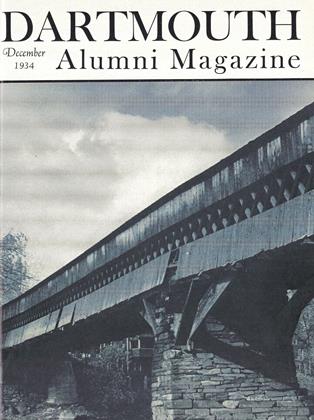By Kimball Flaccus '33. Charles Scribner's Sons, 1934. Avalanche of April is a poem in three parts, preceded by a lyrical invocation, and ended by a fine lyrical epilogue.
Part one, called Place, may appear at first glance to be chiefly descriptive: it records the pleasures and ardors of canoeing, cabin building, mountain climbing, skiing, the tingle of man's blood in spring, the changing pace of the New Hampshire landscape during the four seasons. There is a brief allusion to a loved girl and an estrangement. But behind the description lies reflection. The writer contemplates the meaning of time for man and its different meaning for nature. More important, he suggests in this section what he states explicity later, in the following lines:
Place gleams identity from the frail lives,The ambushed hopes of desperate men andwomen,Reflects the bravery of chance adventure,Assents to treacherous action, yet remainsA mere indifferent backdrop to the stage."
Hence Mr. Flaccus' descriptions of scene are haunted always by a sense of the human history which gives the scene meaning. The Indian, the pioneer, the New Hampshire farmer and artisan are implicitly remembered in every line.
Part two is called Personality. Against the background of our countryside it projects the Indian, and the figures of Ezekial Carver, adventurer and pioneer; Amanda Stevens, New Hampshire spinster; Walt Whitman, Richard Hovey, Robert Frost, Dartmouth poets; and John Wallace, Vermont stonecutter, jobless, rebellious, our luckless contemporary. It ends with an appeal to the youth of today to embrace youth's challenging heritage: nature, the abundant earth.
Part three is called Belief. Since I have small space for this review I can do no more than quote a few. lines which will suggest the poet's philosophy.
"Casting about for some denominatorTo prove the essential oneness betweenpoet
And visible world, between beauty andpain,I came eventually to call it passion.
"Passion alone can thaw the human mind,Make science beautiful, gives wings tologic.
"I hold in fine, reasonable scornFalse learning gained, and facts unverifiedBy the intuitive reason of the blood."
But, the poet goes on to say, we must have more than passion and the strength which comes from it; we must have grace: "the ultimate touch to courtesy in man."
The lines quoted, by no means a fair sample of Mr. Flaccus' work, convey only a hint of the beliefs stated in part three.
Avalanche of April is a poem to be taken seriously. I do not think that it is a great poem, however. It is very uneven; there are passages of rhythmical monotony or awkwardness; the pathetic fallacy is once or twice misused, as in section X; and there are occasional lapses of taste when the poet is speaking of love. A more vital criticism is that though the poem is based on first-hand thought and feeling, it seems "literary." I mean that the reader feels a sense of effort in it: a self-conscious and deliberate seeking out of the fine epithet, a stern pursuit of simile and metaphor. Keats said that poetry is "Might half-slum-bering on its own right arm." In this poem every muscle is tense.
But though it is not a great poem, it is a good one. In the very best sense, Mr. Flaccus takes himself seriously, and we must do the same.
 View Full Issue
View Full Issue
More From This Issue
-
 Article
ArticleHANOVER BROWSING
December 1934 By Herbert F. West '22 -
 Class Notes
Class NotesClass of 1914
December 1934 By Edward Leech -
 Class Notes
Class NotesClass of 1911
December 1934 By Prof. Nathaniel G. Burleigh -
 Class Notes
Class NotesClass of 1918
December 1934 By Allan C. Gottschaldt -
 Article
ArticleHIS EXCELLENCY, THE GOVERNOR
December 1934 By Prof. Herbert W. Hill -
 Class Notes
Class NotesClass of 1910
December 1934 By Harold P. Hinman









